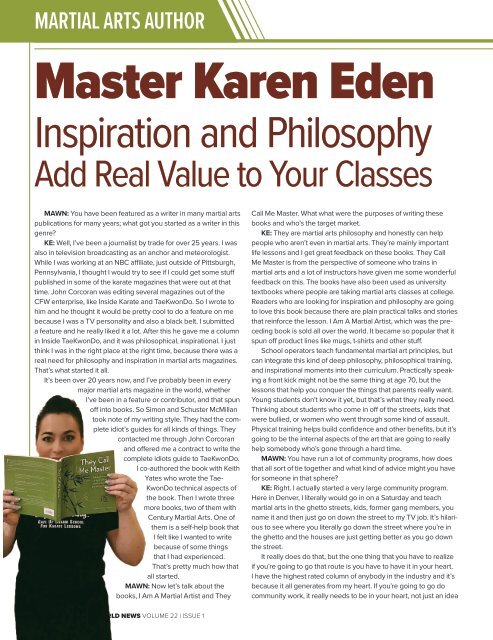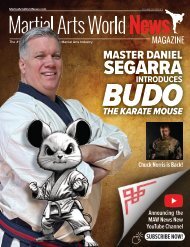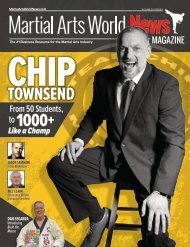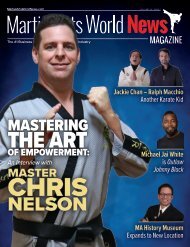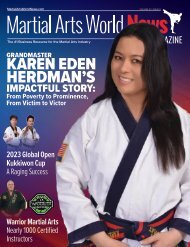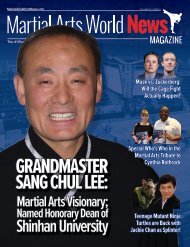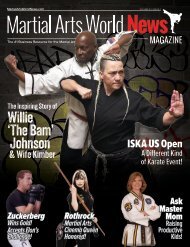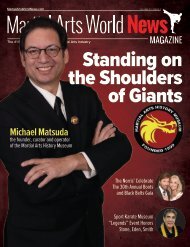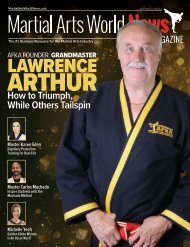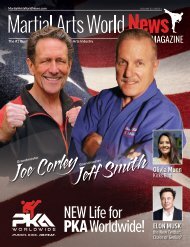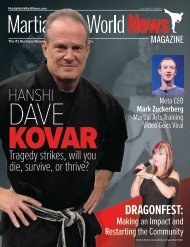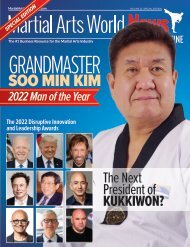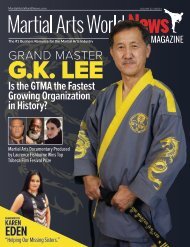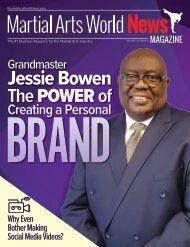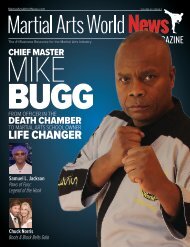Martial Arts World News Magazine - Volume 22 | Issue 1
The #1 Business Resource for the Martial Arts Industry
The #1 Business Resource for the Martial Arts Industry
Create successful ePaper yourself
Turn your PDF publications into a flip-book with our unique Google optimized e-Paper software.
MARTIAL ARTS AUTHOR<br />
Master Karen Eden<br />
Inspiration and Philosophy<br />
Add Real Value to Your Classes<br />
MAWN: You have been featured as a writer in many martial arts<br />
publications for many years; what got you started as a writer in this<br />
genre?<br />
KE: Well, I’ve been a journalist by trade for over 25 years. I was<br />
also in television broadcasting as an anchor and meteorologist.<br />
While I was working at an NBC affiliate, just outside of Pittsburgh,<br />
Pennsylvania, I thought I would try to see if I could get some stuff<br />
published in some of the karate magazines that were out at that<br />
time. John Corcoran was editing several magazines out of the<br />
CFW enterprise, like Inside Karate and TaeKwonDo. So I wrote to<br />
him and he thought it would be pretty cool to do a feature on me<br />
because I was a TV personality and also a black belt. I submitted<br />
a feature and he really liked it a lot. After this he gave me a column<br />
in Inside TaeKwonDo, and it was philosophical, inspirational. I just<br />
think I was in the right place at the right time, because there was a<br />
real need for philosophy and inspiration in martial arts magazines.<br />
That’s what started it all.<br />
It’s been over 20 years now, and I’ve probably been in every<br />
major martial arts magazine in the world, whether<br />
I’ve been in a feature or contributor, and that spun<br />
off into books. So Simon and Schuster McMillan<br />
took note of my writing style. They had the complete<br />
idiot’s guides for all kinds of things. They<br />
contacted me through John Corcoran<br />
and offered me a contract to write the<br />
complete idiots guide to TaeKwonDo.<br />
I co-authored the book with Keith<br />
Yates who wrote the Tae-<br />
KwonDo technical aspects of<br />
the book. Then I wrote three<br />
more books, two of them with<br />
Century <strong>Martial</strong> <strong>Arts</strong>. One of<br />
them is a self-help book that<br />
I felt like I wanted to write<br />
because of some things<br />
that I had experienced.<br />
That’s pretty much how that<br />
all started.<br />
MAWN: Now let’s talk about the<br />
books, I Am A <strong>Martial</strong> Artist and They<br />
Call Me Master. What what were the purposes of writing these<br />
books and who’s the target market.<br />
KE: They are martial arts philosophy and honestly can help<br />
people who aren’t even in martial arts. They’re mainly important<br />
life lessons and I get great feedback on these books. They Call<br />
Me Master is from the perspective of someone who trains in<br />
martial arts and a lot of instructors have given me some wonderful<br />
feedback on this. The books have also been used as university<br />
textbooks where people are taking martial arts classes at college.<br />
Readers who are looking for inspiration and philosophy are going<br />
to love this book because there are plain practical talks and stories<br />
that reinforce the lesson. I Am A <strong>Martial</strong> Artist, which was the preceding<br />
book is sold all over the world. It became so popular that it<br />
spun off product lines like mugs, t-shirts and other stuff.<br />
School operators teach fundamental martial art principles, but<br />
can integrate this kind of deep philosophy, philosophical training,<br />
and inspirational moments into their curriculum. Practically speaking<br />
a front kick might not be the same thing at age 70, but the<br />
lessons that help you conquer the things that parents really want.<br />
Young students don’t know it yet, but that’s what they really need.<br />
Thinking about students who come in off of the streets, kids that<br />
were bullied, or women who went through some kind of assault.<br />
Physical training helps build confidence and other benefits, but it’s<br />
going to be the internal aspects of the art that are going to really<br />
help somebody who’s gone through a hard time.<br />
MAWN: You have run a lot of community programs, how does<br />
that all sort of tie together and what kind of advice might you have<br />
for someone in that sphere?<br />
KE: Right. I actually started a very large community program.<br />
Here in Denver, I literally would go in on a Saturday and teach<br />
martial arts in the ghetto streets, kids, former gang members, you<br />
name it and then just go on down the street to my TV job. It’s hilarious<br />
to see where you literally go down the street where you’re in<br />
the ghetto and the houses are just getting better as you go down<br />
the street.<br />
It really does do that, but the one thing that you have to realize<br />
if you’re going to go that route is you have to have it in your heart.<br />
I have the highest rated column of anybody in the industry and it’s<br />
because it all generates from my heart. If you’re going to go do<br />
community work, it really needs to be in your heart, not just an idea<br />
28 MARTIAL ARTS WORLD NEWS VOLUME <strong>22</strong> | ISSUE 1


